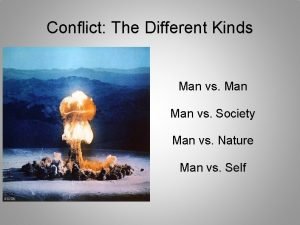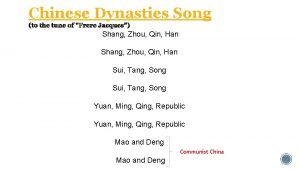Man Qin Shang Hai Finance University Shang Hai

- Slides: 1

Man Qin, Shang. Hai Finance University, Shang. Hai, China; Huke Si, Shanghai University of Sports, Shanghai, China ABSTRACT KNOWLEDGE TRANSFER MODEL RESULTS Background/Purpose: The purpose of this study was to examine the process and influencing factors of PE teachers in higher education. Method: A survey with four factors (i. e. , knowledge characteristics, knowledge sender, recipient of knowledge and knowledge transfer scenarios), which were measured 2 -4 questions in a 5 -point (1=Strong disagree, 2=Disagree, 3=Neutral, 4=Agree, 5=Strongly agree) Likert scale, was mailed to 500 PE teachers in 30 colleges/universities in 9 provinces, China. Analysis/Results: Ratings (M±SD, the higher, the more positive on knowledge transfer) on the factors and related questions are summarized below: 1. Knowledge Characteristics. (3. 59±. 49): Knowledge complexity (3. 73± 1. 74), Knowledge embeddedness (3. 70± 1. 91), and Tacit of knowledge (3. 65± 2. 19); 2. Knowledge Sender. (3. 03±. 47): Transfer ability (4. 02± 1. 79) and Transfer motivation (3. 65± 2. 89) 3. Recipient of Knowledge. (3. 76±. 42): Study motivation(3. 99± 2. 89), Application ability (3. 70± 1. 61) and Absorptive ability (3. 60± 2. 64) 4. Knowledge Transfer Scenarios. (3. 28±. 50): Organizational culture (3. 29± 3. 29), Incentive (3. 45± 1. 87), Knowledge distance (3. 24± 1. 64), and Transfer method (3. 24± 3. 66). Conclusions: Knowledge transfer of PE teachers in higher education was closely related with knowledge absorptive ability, knowledge transfer ability and transfer method. Understanding of the process and influencing factors of PE teachers’ knowledge transfer could improve idea creation, sharing, evaluation, dissemination, and adoption; as a result, to improve their teaching performance and effectiveness, as well as provide guidance for the in-serve training for the PE teachers. The internal impelling forces of PE teacher’s knowledge transfer are trust, respect, selfactualization and personal preference; the external impelling forces are organizational culture, transfer canal, incentive mechanis and policy promotion. Ratings (M±SD, the higher, and the more positive on knowledge transfer) on the factors and related questions are summarized below: Knowledge Characteristics (3. 59±. 49): , Knowledge complexity (3. 73± 1. 74), Knowledge embeddedness (3. 70± 1. 91), &Tacit of knowledge (3. 65± 2. 19); Knowledge Sender (3. 03±. 47): Transfer ability (4. 02± 1. 79) and Transfer motivation (3. 65± 2. 89) Recipient of Knowledge (3. 76±. 42): Study motivation(3. 99± 2. 89), Application ability (3. 70± 1. 61) and Absorptive ability (3. 60± 2. 64) Knowledge Transfer Scenarios(3. 28±. 50): Organizational culture (3. 29± 3. 29), Incentive (3. 45± 1. 87), Knowledge distance (3. 24± 1. 64), and Transfer method (3. 24± 3. 66). “Transfer Results” and “Satisfaction, ”two perceived measures of knowledge transfer performance, scored 3. 91± 1. 36 and 3. 58± 3. 65, respectively. Further regression analyses indicated Absorption capacity, Transfer ability, Organizational culture, Knowledge distance, Transfer method, and Transfer motivation are statistically significant predictors (p<. 05) of Transfer Result; and Absorption capacity, Transfer method, Transfer ability, Application ability, and Motivation are the significant predictor of Satisfaction. The knowledge transfer double factors driving model of PE teachers in college PURPOSE The purpose of this study was to examine the process and influencing factors of PE teachers in higher education. INTRODUCTION Knowledge is the most important concept during 21 century. All trades and professions depend more and more on the processions and abundance of knowledge during the knowledge economy era. Under such a background, more and more people pay attention to the knowledge management. Knowledge is a dominant feature in today’s post-industrial society, but little is known about knowledge transfer process and related influence factors of physical education (PE) teachers. Some studies have found that, due to their professional characteristics (e. g. , their own physical fitness and sport skill competency), PE teachers in higher education ignored the absorption and application of academic knowledge, leading to an increasingly apparent jobpeople-knowledge mismatch. The purpose of this study was to examine the process and influencing factors of PE teachers in higher education. athematical Formula Number of people Minimum value Maximumvalue mean Standard deviation Number of items mean 1. knowledge complexity 441 6. 00 15. 00 11. 1882 1. 74472 3 3. 73 2. knowledge embedability 450 4. 00 15. 00 10. 9378 2. 18634 3 3. 65 3. knowledge recessivity 456 5. 00 11. 0899 1. 91656 3 3. 70 4. transfer motivation 453 4. 00 20. 00 14. 6093 2. 89026 4 3. 65 5. transfer ability 446 5. 00 11. 8498 1. 79070 3 3. 95 6. study motivation 445 9. 00 25. 00 19. 6247 2. 89234 5 3. 92 7. absorption ability 449 10. 00 25. 00 18. 0223 2. 63551 5 3. 60 8. application ability 458 6. 00 15. 00 11. 1070 1. 60943 3 3. 70 9. knowledge distance 456 8. 00 12. 9496 1. 64273 4 3. 24 10. prompting mechanism 456 5. 00 10. 3640 1. 87263 3 3. 45 11. organization culture 450 7. 00 35. 00 23. 0133 5. 14250 7 3. 29 12. transfer mode 460 5. 00 25. 00 16. 2174 3. 66110 5 3. 24 13. performance 460 2. 00 10. 00 8. 0522 1. 35501 3 3. 91 14. degree satisfaction 448 10. 00 30. 00 21. 6138 3. 64480 5 3. 58 Variables CONCLUSIONS Infencing factors model of knowledge transfer model METHODS The research designed 12 variables concentrating on the four elements, such as knowledge attributes, knowledge sender, knowledge accepter and knowledge situation, which were involved in the process during the knowledge transfer of PE teachers of colleges/universities. The names of these variables are as follows: Knowledge complexity, knowledge embedability, knowledge recessivity, transfer motivation, transfer ability, study motivation, absorption ability, application ability, knowledge distance, prompting mechanism, organization culture and transfer mode. A survey with four factors (i. e. , knowledge characteristics, knowledge sender, recipient of knowledge and knowledge transfer scenarios), which were each measured by 2 -4 questions in a 5 -point (1=Strong disagree, 2=Disagree, 3=Neutral, 4=Agree, 5=Strongly agree) Likert scale, was mailed to 500 PE teachers in 30 colleges/universities in 9 provinces, China. A total of 461 (response rate = 92. 2 %) returned the survey, with 57. 9% male, mean age = 38. 6 yr. (SD = 1. 73), and mean teaching experience =14. 8 yr. (SD = 3. 43). The collected data were analyzed using descriptive statistics, correlations and multiple regressions. Knowledge transfer of PE teachers in higher education was closely related with knowledge absorptive ability, knowledge transfer ability and transfer method. Understanding of the process and influencing factors of PE teachers’ knowledge transfer could improve idea creation, sharing, evaluation, dissemination, and adoption; as a result, to improve their teaching performance and effectiveness, as well as provide guidance for the in-serve training for the PE teachers. The disability of knowledge absorption and transfer, inequality opportunities of knowledge transfer, embedded-ness and tacit of knowledge, dependence of the young teachers on the organizational environment and their own stock of knowledge deficiency, non-validity of knowledge application environment and lack of the knowledge management abilities are the key issues affecting the college/university PE teachers knowledge transfer process currently. To solve these problems, we proposed 16 measures from 5 aspects, the cultivation of college/university PE teachers in knowledge absorption and transfer ability as the key elements, with scientific and rational internal organization of the mechanism for the support, select the appropriate knowledge transfer mechanism to reduce the knowledge embedability and recessivity. At the same time, there is a need to establish a long-term mechanism to train college/university PE teachers’ individual knowledge management ability. ACKNOWLEDGEMENT I would like to extend my sincere gratitude to Professor Weimo Zhu for his instructive suggestions for this study.

